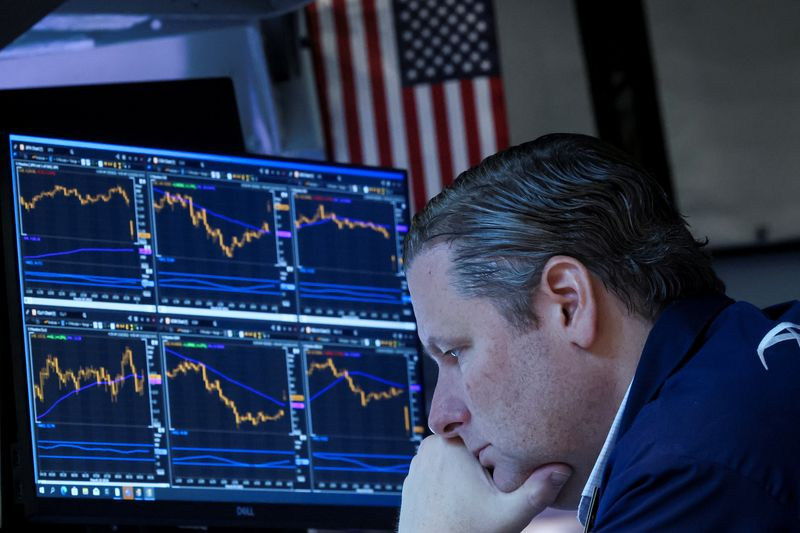Trump's NYSE Bell Ringing: A Historic Moment & Economic Outlook
Meta Description: Trump's NYSE bell ringing, Time Magazine's Person of the Year, economic policies, tax cuts, stock market impact, Wall Street reaction, 2024 election.
The air crackled with anticipation. The New York Stock Exchange (NYSE), a temple of finance, buzzed with an unusual energy. It wasn't just another trading day; it was a spectacle, a confluence of power, politics, and the pulsating heartbeat of American capitalism. Donald Trump, the President-elect, stood poised to ring the opening bell, a symbolic gesture amplified by his recent coronation as Time Magazine's Person of the Year – a title he'd previously held, cementing his unique place in history. This wasn't merely about ringing a bell; it was about sending a powerful message to the world, a declaration of intent for his upcoming administration. The event drew a who's who of Wall Street titans – CEOs from Goldman Sachs, Citigroup, Target, and Verizon were among the attendees, their presence a silent endorsement of the incoming administration's economic agenda. The scene was electric, captured in a flurry of live streams and social media posts echoing across the globe, painting a vivid picture of what promises to be a transformative era in American economics. The event transcended the usual ceremonial protocols, becoming a potent narrative – a powerful blend of spectacle and substance, anticipation and reality. What exactly did this unprecedented event signify for the future of the American economy and the global markets? Let's delve into the details and analyze the implications.
Trump's Economic Agenda: Tax Cuts and Energy Independence
Trump's NYSE appearance wasn't just a photo opportunity; it served as a platform to reiterate his key economic promises. His speech, brief but impactful, focused on two central pillars: significant tax cuts and a renewed emphasis on American energy independence. He promised "unprecedented economic growth," driven by substantial tax reductions – a bold claim echoing his 2016 campaign rhetoric. Specifically, he reiterated his plan to slash the corporate tax rate to 15%, but with a crucial caveat: this reduced rate would only apply to companies manufacturing their products within the United States. Companies choosing to produce overseas would face the standard 21% rate. This "Made in America" tax incentive aims to revitalize domestic manufacturing and curb the trend of offshoring. This nuanced approach, while potentially controversial, seeks to incentivize businesses to invest in American jobs and infrastructure.
Furthermore, Trump championed an expansion of domestic oil drilling, claiming this would combat inflation. This policy reflects his broader strategy of energy independence, aiming to reduce reliance on foreign oil and strengthen America's energy security. His comments echoed a clear message: a focus on domestic production and a belief in the power of American industry to drive economic growth. The implications are far-reaching, potentially impacting everything from job creation to international trade relations.
This strategy isn't without its critics. Some argue that focusing solely on domestic production could lead to higher prices for consumers and limit access to a global market, potentially impacting innovation. Others question the effectiveness of tax cuts as a primary driver of economic growth, especially in the context of a potentially already overheated economy. However, Trump's supporters see his policies as a crucial step towards restoring American economic dominance.
| Policy | Description | Potential Benefits | Potential Drawbacks |
|--------------------------|----------------------------------------------------------------------------------------|-------------------------------------------------------------------------|-----------------------------------------------------------------------|
| Corporate Tax Cuts (15%) | Reduced corporate tax rate for companies manufacturing in the US. | Attracts investment, boosts domestic manufacturing, creates jobs. | Could widen the income gap, potentially lead to inflation. |
| Increased Oil Drilling | Expansion of domestic oil production. | Reduces reliance on foreign oil, improves energy security, lowers prices. | Environmental concerns, potential negative impact on climate change goals. |
Wall Street's Reaction: A Mixed Bag
The presence of prominent Wall Street CEOs at the NYSE event hinted at a cautiously optimistic attitude toward the incoming administration. While the market reacted positively in the short term, the long-term impact remains uncertain. Some analysts believe that Trump’s focus on deregulation and tax cuts could boost corporate profits and spur investment, leading to sustained economic growth. However, others express concern about the potential for increased national debt and inflationary pressure, potentially negating any positive effects.
The reaction on social media was equally divided, with some hailing Trump's economic agenda as a recipe for prosperity, while others criticized it as potentially harmful to the environment and economically unsustainable. This polarization reflects the deep divisions within American society regarding economic policy and the role of government. The ensuing years will be crucial in determining whether Trump's policies deliver on their promises.
Time Magazine's Person of the Year: A Controversial Choice?
Trump's selection as Time's Person of the Year, for the second time, is undeniably noteworthy. While the magazine emphasizes that the award doesn't necessarily equate to endorsement, the choice reflects his undeniable influence on global events. His 2016 cover, "President of a Divided States of America," contrasted sharply with the 2024 version, simply stating "Donald Trump." This difference highlights the evolution of his image and his enduring power in shaping the American political landscape. However, the selection remains controversial given his polarizing nature and the complexities of his political legacy. The selection process and criteria have always been a subject of debate, leading to ongoing discussion about the magazine's editorial choices.
Frequently Asked Questions (FAQs)
Q1: What is Trump’s stated goal for economic growth?
A1: Trump aims for “unprecedented economic growth” through tax cuts and energy independence initiatives.
Q2: How will the proposed 15% corporate tax rate affect businesses?
A2: Only companies manufacturing in the US will benefit from the 15% rate; those producing overseas will pay 21%.
Q3: What is the potential impact of increased oil drilling on the environment?
A3: Increased oil drilling raises concerns about environmental damage and its contribution to climate change.
Q4: What was the overall sentiment on Wall Street regarding Trump's NYSE appearance?
A4: Wall Street's reaction was mixed, with cautious optimism expressed by some, while others voiced concerns about potential negative consequences.
Q5: How does Trump's second Time Person of the Year award reflect his influence?
A5: It highlights his enduring impact on American politics and global events, despite the controversy surrounding his presidency.
Q6: What role did social media play in the aftermath of the event?
A6: Social media amplified the event, with opinions sharply divided, reflecting the polarized nature of American political discourse.
Conclusion: A Defining Moment
Trump's NYSE bell-ringing ceremony, coinciding with his Time Person of the Year recognition, served as a powerful symbol of his return to the national stage. His economic promises, focusing on significant tax cuts and energy independence, have set the stage for what promises to be a period of significant economic transformation. The event's impact remains to be seen, with potential benefits and drawbacks both significant. The coming years will offer a crucial test of his economic vision and its ability to deliver on its ambitious promises. The success or failure of these policies will significantly shape not only the American economy but also the global economic landscape. The world watches with bated breath.



